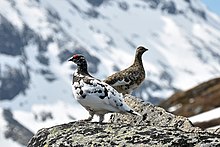Rock ptarmigan
| Rock ptarmigan | |
|---|---|
 |
|
| A pair in spring plumage in Norway
Display song, Glenshee, Scotland
|
|
| Scientific classification | |
| Kingdom: | Animalia |
| Phylum: | Chordata |
| Class: | Aves |
| Order: | Galliformes |
| Family: | Phasianidae |
| Subfamily: | Tetraoninae |
| Genus: | Lagopus |
| Species: | L. muta |
| Binomial name | |
|
Lagopus muta (Montin, 1781) |
|
| Subspecies | |
|
some 20–30, including:
|
|
 |
|
| Rock Ptarmigan range | |
 |
|
| Distribution in Europe | |
 |
|
| Distribution in North America | |
| Synonyms | |
|
|
some 20–30, including:
The rock ptarmigan (Lagopus muta) is a medium-sized gamebird in the grouse family. It is known simply as the ptarmigan in the UK and in Canada, where it is the official bird for the territory of Nunavut, Canada, and the official game bird for the province of Newfoundland and Labrador, Canada, and colloquially as the snow chicken in the United States. In Japan, it is known as the raichō (雷鳥), which means "thunder bird". It is the official bird of Gifu, Nagano, and Toyama Prefectures and is a protected species nationwide.
The rock ptarmigan is 34–36 cm (13–14 in) long (tail 8 cm (3.1 in)) with a wingspan of 54–60 cm (21–24 in). It is smaller than the willow ptarmigan by about 10%. The male's "song" is a loud croaking.
The rock ptarmigan is seasonally camouflaged; its feathers moult from white in winter to brown in spring or summer. The breeding male has greyish upper parts with white wings and under parts. In winter, its plumage becomes completely white except for the black tail. It can be distinguished from the winter willow ptarmigan (willow ptarmigan in North America) by habitat—the rock ptarmigan prefers higher elevations and more barren habitat; it is also smaller with a more delicate bill.
The rock ptarmigan is a sedentary species which breeds across arctic and subarctic Eurasia and North America (including Greenland) on rocky mountainsides and tundra. It is widespread in the Arctic Cordillera and is found in isolated populations in the mountains of Scotland, the Pyrenees, the Alps, Bulgaria, the Urals, the Pamir Mountains, the Altay Mountains, and Japan—where it occurs only in the Japan Alps and on Hakusan mountain. Because of the remote habitat in which it lives, it has only a few predators—such as golden eagles—and it can be surprisingly approachable. It has been introduced to New Zealand, South Georgia, the Kerguelen Islands, and the Crozet Islands.
...
Wikipedia

